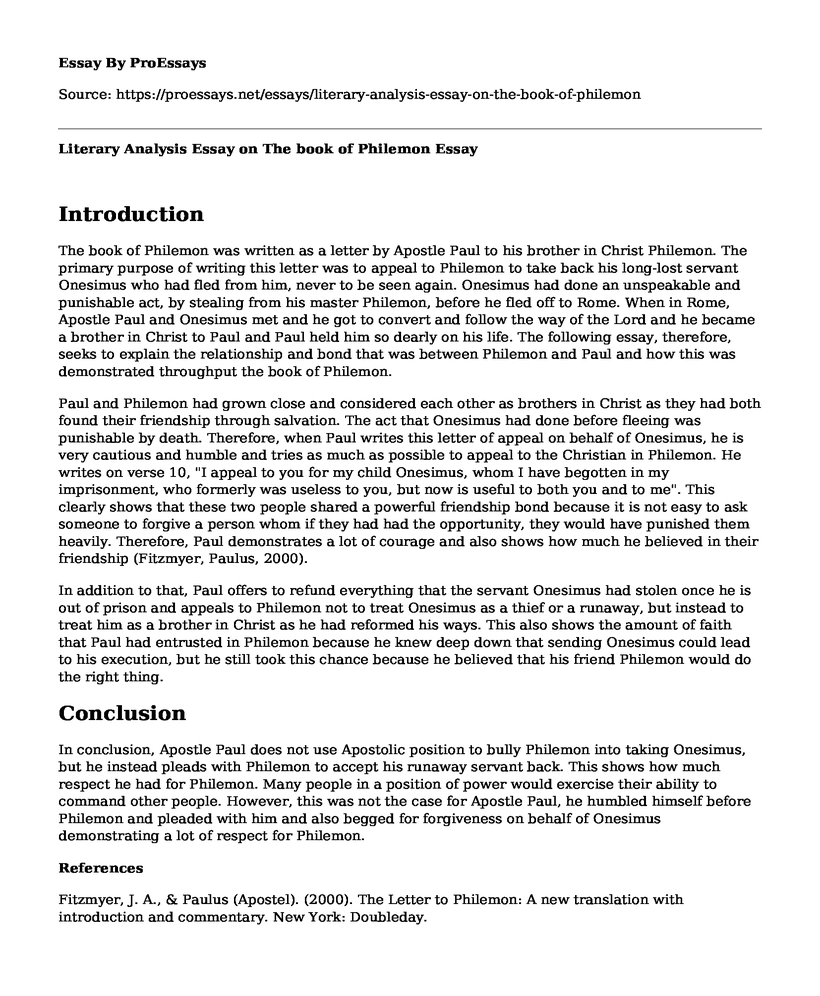Introduction
The book of Philemon was written as a letter by Apostle Paul to his brother in Christ Philemon. The primary purpose of writing this letter was to appeal to Philemon to take back his long-lost servant Onesimus who had fled from him, never to be seen again. Onesimus had done an unspeakable and punishable act, by stealing from his master Philemon, before he fled off to Rome. When in Rome, Apostle Paul and Onesimus met and he got to convert and follow the way of the Lord and he became a brother in Christ to Paul and Paul held him so dearly on his life. The following essay, therefore, seeks to explain the relationship and bond that was between Philemon and Paul and how this was demonstrated throughput the book of Philemon.
Paul and Philemon had grown close and considered each other as brothers in Christ as they had both found their friendship through salvation. The act that Onesimus had done before fleeing was punishable by death. Therefore, when Paul writes this letter of appeal on behalf of Onesimus, he is very cautious and humble and tries as much as possible to appeal to the Christian in Philemon. He writes on verse 10, "I appeal to you for my child Onesimus, whom I have begotten in my imprisonment, who formerly was useless to you, but now is useful to both you and to me". This clearly shows that these two people shared a powerful friendship bond because it is not easy to ask someone to forgive a person whom if they had had the opportunity, they would have punished them heavily. Therefore, Paul demonstrates a lot of courage and also shows how much he believed in their friendship (Fitzmyer, Paulus, 2000).
In addition to that, Paul offers to refund everything that the servant Onesimus had stolen once he is out of prison and appeals to Philemon not to treat Onesimus as a thief or a runaway, but instead to treat him as a brother in Christ as he had reformed his ways. This also shows the amount of faith that Paul had entrusted in Philemon because he knew deep down that sending Onesimus could lead to his execution, but he still took this chance because he believed that his friend Philemon would do the right thing.
Conclusion
In conclusion, Apostle Paul does not use Apostolic position to bully Philemon into taking Onesimus, but he instead pleads with Philemon to accept his runaway servant back. This shows how much respect he had for Philemon. Many people in a position of power would exercise their ability to command other people. However, this was not the case for Apostle Paul, he humbled himself before Philemon and pleaded with him and also begged for forgiveness on behalf of Onesimus demonstrating a lot of respect for Philemon.
References
Fitzmyer, J. A., & Paulus (Apostel). (2000). The Letter to Philemon: A new translation with introduction and commentary. New York: Doubleday. http://epubokfree.com/the-letter-to-philemon-a-new-translation-with-introduction-and-commentary-download-pdf-free-finding-books.pdf.
Cite this page
Literary Analysis Essay on The book of Philemon. (2022, Nov 20). Retrieved from https://proessays.net/essays/literary-analysis-essay-on-the-book-of-philemon
If you are the original author of this essay and no longer wish to have it published on the ProEssays website, please click below to request its removal:
- Notable Contributions to Christianity - Religion Essay Example
- Compare and Contrast Essay on The Scarlet Letter and Young Goodman Brown
- Specimens of Bushmen Folklore Paper Example
- How It Feels to Be Colored Me by Zora Hurston Analysis Paper Example
- Mayor Bloomberg Speech on Ground Zero Mosque at Governor's Island
- Essay Example on H.G. Wells's The Pearl of Love: Love, Loss, Devotion & Obsession
- Analytical Essay Sample on the Importance of Reading for a Writer







